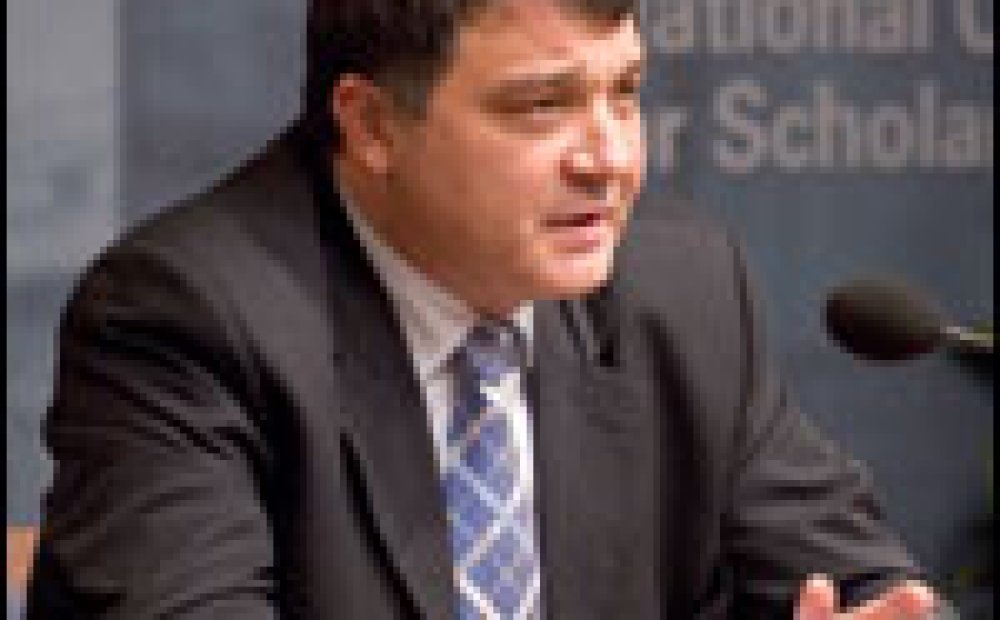<b>Live Webcast</b>--Bulgaria in NATO: A New Framework for Regional Security

Minister Svinarov discussed key issues in collective security and defense, and highlighted some of the political and operational challenges that Bulgaria had addressed in the run-up to full membership in the NATO alliance, finally achieved in 2004. He also expounded on the country's pro-active stance in the war against terrorism, and its alignment as a strategic partner for enduring peace and stability in the Balkans and surrounding regions.
Minister Svinarov stressed the importance of Bulgaria's shared interests with its NATO allies in promoting peace, security, the protection of human rights and individual freedom, within the framework of open and democratic societies, goals that are supported by Bulgaria's general public and political elite.
In 2004, the Bulgaria National Assembly also adopted the Strategic Defense Review, initiating the process of building new defense capabilities. Radical change in defense policy to establish "effective, multifunctional, modular forces that are interoperable and deployable" became the overriding objective of the Defense Ministry. These efforts have taxed the already strained economic and financial resources of the country, according to the Minister, resulting in transformational deficiencies stemming from the new defense and security architecture that will continue into the near future. Bulgaria is looking to its NATO partners for support to implement the radical changes called for in the review.
Minister Svinarov stressed that Bulgaria no longer faces traditional security threats. Instead, Bulgaria faces the risks and challenges of new asymmetrical threats that come with joining the NATO alliance. Bulgaria, he stated, needs to achieve interoperability on all levels of its three services, as well as the Joint Command. Some of the main objectives include: new interoperable equipment for both the light and heavy infantry; installation of a stable coastal surveillance system in the Black Sea region; and a new air force based on helicopters and multifunctional airplanes. The goal is a professional military force streamlined in size, but well equipped to guarantee the security of the country and participation in essential alliance operations abroad.
In regards to the global war on terrorism, Minister Svinarov, stated that no single country can face the challenges posed by new dynamics. Only the united effort of democratic countries with a common interest in stability can secure that goal. Bulgaria has contributed to the global war on terrorism through active coalition participation in Afghanistan and Iraq, and stabilization forces in Bosnia and Kosovo. The Minister stated that Bulgaria is expected to increase its responsibilities in Afghanistan by assuming management and control of Kabul airport under the NATO peacekeeping force.
Minister Svinarov emphasized Bulgaria's readiness to work within the alliance, strengthen its own democratic institutions, and help establish a regional environment that guarantees greater security, stability, and democracy. He also pointed out that Bulgaria is in a strategic position as the eastern boundary of the alliance, serving as a stabilizing force beyond the Balkans.
The Minister commented that he sees Bulgaria – Greece relations developing positively, and stressed that Bulgaria is appreciative of Greek and Turkish support that helped secure NATO membership. He expressed his hope that Greece will continue to be especially supportive in all fields, especially in the defense sector.
Hosted By

Global Europe Program
The Global Europe Program is focused on Europe’s capabilities, and how it engages on critical global issues. We investigate European approaches to critical global issues. We examine Europe’s relations with Russia and Eurasia, China and the Indo-Pacific, the Middle East and Africa. Our initiatives include “Ukraine in Europe”—an examination of what it will take to make Ukraine’s European future a reality. But we also examine the role of NATO, the European Union and the OSCE, Europe’s energy security, transatlantic trade disputes, and challenges to democracy. The Global Europe Program’s staff, scholars-in-residence, and Global Fellows participate in seminars, policy study groups, and international conferences to provide analytical recommendations to policy makers and the media. Read more
